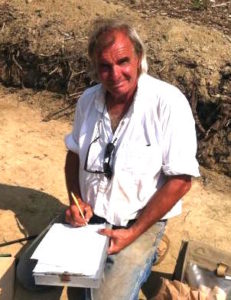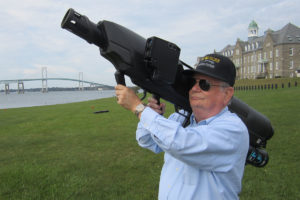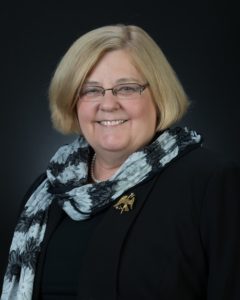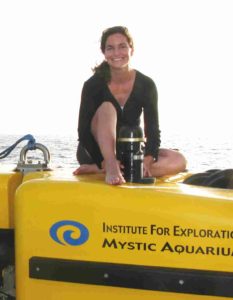Society – History – Nature – Technology
Presentations You Will Not Want To Miss
6:00 PM, Chaplin B. Barnes Reading Room
Lanphear Livery
One Bay Street
Watch Hill
Free Admission
July 9
Game-changing Discoveries in RI–CT Coastal Archaeology
Dr. Kevin McBride, Ph.D.
Associate Professor of Anthropology, University of Connecticut & Director of Research, Mashantucket Pequot Museum

Dr. McBride will use archaeology to paint a picture of the first inhabitants of Little Narragansett Bay and Block Island Sound. And a long history it is – McBride’s research on Block Island has revealed Native American settlements 2,500 years old! The first major confrontations between colonists and Native Americans took place in the region of Mystic, Stonington, Westerly, and Charlestown. Our coastal setting played a prominent role in the early history of New England.
Bio Brief: Dr. McBride is an archaeologist specializing in Native American history of southern New England. He is THE authority on the pre-colonial history of our region. McBride’s studies include the discovery of an ancient settlement of Manisses Indians on Block Island, description of the Pequot Massacre in Mystic (first war on the continent between English settlers and native Americans), and surveying archaeological sites along the southern Rhode Island coast that were exposed by erosion during Hurricane Sandy. Napatree Point was one of the study sites in the post-Sandy assessment.
July 23
The Drones Are Coming!
Professor John E. Jackson, CAGS, M.S., M.E.
Professor
Naval War College
Professor John Jackson will discuss the past, present and future uses of robotic and unmanned systems, both in the military services and in private use. His fast-paced and fact-filled presentation will discuss the systems involved, the operational challenges they address, and the legal and ethical ramifications of their use. He will address everything you always wanted to know about drones, but were afraid to ask! He currently serves on the faculty of the Naval War College in Newport, Rhode Island.

Bio Brief: Professor Jackson retired from the US Navy at the rank of Captain after 27 years of active service. He has taught at the Naval War College for the last 20 years. His areas of expertise are national security decision-making, logistics, and the role of unmanned systems in conflict. He is the recipient of the Department of Navy Meritorious Civilian Service Award and the US Navy Legion of Merit. The teaches a course entitled “Unmanned Systems and Conflict in the 21st Century” where he provides students with broad exposure to current and projected unmanned and robotic systems in use with the Department of Defense and in the civilian sector.
August 6
Whaling Women of New England
Dr. Yvonne Masakowski, Ph.D.
Associate Professor
Naval War College

Throughout the eighteenth and nineteenth centuries, the whaling industry was thriving and many New Englanders enjoyed the benefits of a maritime economy. We are familiar wi
th whaling adventures such as those reported by Melville in Moby Dick, however, the life of the whaling women remains a hidden mystery. Little attention has been paid to the critical role that women played during these voyages whether as senior navigators at sea or maintaining their community while their husbands worked these dangerous whaling voyages.
Bio Brief: Dr. Masakowski teaches leadership and leader development at the Naval War College. She is the US Chair of the NATO panel on leader development for multinational military operations. She has served on several NATO panels and published numerous books, book chapters, and articles in military leadership development. She is the recipient of many international and national awards including the US Navy Achievement Award. Dr. Masakowski’s courses include “Crosscultural Competence for Adaptive Leaders” and “Leadership and War Viewed Through the Humanities.”
August 13
New Frontiers in Ocean Exploration: Innovative Applications of Technology Enabling Remote Participation Through National Oceanic and Atmospheric Administration’s (NOAA’s) Office of Ocean Exploration and Research
Catalina Martinez, M.S., M.M.A.
Regional Program Manager
NOAA Office of Ocean Exploration and Research

Catalina Martinez is the regional manager for ocean exploration and research for NOAA. NOAA’s most technically advanced research ship, The Okeanos Explorer, has a home port of Quonset, Rhode Island. The Inner Space Center at URI’s Graduate School of Oceanography is a one-of-a kind facility that allows a real-time telepresence connection between a research vessel at sea and viewers from all over the world. Ocean exploration by the world’s leading scientists, including URI’s Robert Ballard, among others, comprise Catalina’s portfolio of projects that she manages. Telepresence allows other scientists, school children, and the public to share in the excitement of discovery. Catalina will describe these systems and give examples how they are used to support research, exploration, and education.
Bio Brief: Following her graduate studies at URI in Oceanography and Marine Affairs. Catalina worked at NOAA headquarters in Silver Springs, Maryland coordinating sea operations, logistics, and outreach for NOAA research cruises in the world’s unexplored oceans. In 2004 she returned to Rhode Island to serve as the regional program manager for the NOAA Office of Ocean Exploration and Research. She works closely with the Inner Space Center at URI to bring the excitement of discovery in the ocean sciences and marine archaeology into the classroom using telepresence technology. Catalina has spent considerable time at sea as expedition coordinator on more than 20 ocean exploration cruises.